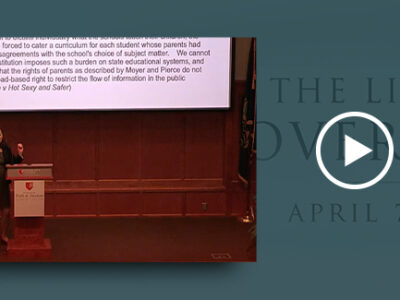Editor’s Note: The “V&V Q&A” is an e-publication from the Center for Vision & Values at Grove City College. Each issue will present an interview with an intriguing thinker or opinion-maker that we hope will prove illuminating to readers everywhere. In this second installment of a special three-part edition of the “V&V Q&A,” the Center for Vision & Values was granted an exclusive interview with acclaimed commentator and best-selling author Dinesh D’Souza regarding his newly released book, What’s So Great About Christianity. D’Souza spoke to the Center for Vision & Values’ Executive Director Dr. Paul Kengor.
Dr. Paul Kengor: Dinesh, there’s this quite stunning, inexplicable refrain that we hear constantly today, from the op-ed pages of the New York Times to email blasts from my atheist friends, about the alleged incompatibility of faith and reason—as if you are either a person of faith or a person of reason. They genuinely seem to have no knowledge that the Church from the very beginning—for 2,000 years—has argued that faith and reason reinforce one another and are mutually compatible. Protestants believe this, and the Catholic Church has noted this vigorously not only since the writings of Thomas Aquinas but all the way back to Clement of Alexandria, and has kept it out front with regular homilies by the current pope, Benedict XVI, and major encyclicals from the last pope, John Paul II, who reaffirmed the “two wings” of faith and reason that lift us to truth and Truth. Anyone with a modicum of religious knowledge would know this. And yet, few secularists seem to be aware of this history, while they simultaneously portray believers as stupid and themselves as smart. What explains the ignorance and the arrogance?
Dinesh D’Souza: The new atheists like Dawkins, Daniel Dennett, Steven Pinker and Victor Stenger are all theological ignoramuses. Their work shows little or no understanding of either Catholic or Protestant thought. I shouldn’t even mention other religions, about which they know even less. One critic, Terry Eagleton, says of Dawkins that his writing about Christian theology has all the credibility of a Christian who attempted to criticize modern science based on knowledge derived solely from a single book on British birds. Not that this stops our intrepid atheists from charging forward. Their motto is, “Take that, Aquinas!” Even Christopher Hitchens, who has a wider literary and cultural range, shows that he has no understanding whatever of thinkers like Augustine and Anselm. At one point he accuses Anselm of arguing that if you can imagine God in your head, then God must exist. This is a very stupid argument, but then Anselm doesn’t make it. Hitchens is a veritable pyromaniac in a field of straw men.
Kengor: Is this what you mean by “miseducating the young?” As for those of this mindset, have they been miseducated on these basics of religion, and are they, in turn, continuing the process now with the next generation?
D’Souza: Something a bit more insidious is going on here. The new atheists realize that the world isn’t going their way and religion is not about to disappear. So they want to take over the minds of the next generation. They want to do this through the schools. Of course, they know that religious parents might want to have something to say about this. Consequently, all the atheist tracts are filled with attacks on the idea that parents should have the authority to teach their children about religion and values. From the atheist point of view, religious education is a form of brainwashing. So schools and colleges are viewed by the atheists as institutions for deprogramming. It’s a little Orwellian, but, of course, the advocates of these schemes present them in the attractive language of “open-mindedness” and “liberation.”
Kengor: How much of this is the fault of not only the lack of religious education in public schools but modern education at secular universities? Some parents reading this right now may be surprised to hear that if their son or daughter takes an elective on religion at many (if not most) of our major universities, the course is likely to be taught by a skeptic if not an atheist, one quite often outright hostile to Christianity, and who at the least sees all religions as basically equal, with none having a rightful claim of truth over the others.
D’Souza: I’m not against the study of comparative religions, or even having skeptics and atheists teach such courses. But if you are going to teach religion you should be knowledgeable about religion and you should approach the subject fairly. When a professor teaches Hamlet in English class, or Hegel in philosophy, you don’t demand that your students believe everything that Shakespeare or Hegel says. But you do ask that they plunge into Shakespeare’s world and Hegel’s thought. You want students, at least provisionally, to go along with the playwright and the philosopher at least to get a sympathetic understanding of what they are trying to convey. Why should religion and Christianity not be taught in the same way?
Kengor: You write that the thinking of the atheist professor toward today’s youth goes like this: “Let the religious people breed them, and we will educate them to despise their parents’ belief.” Thus, you maintain that the secularization of young people in college, for instance, is not so much a natural process of alleged enlightened maturation but one guided and orchestrated by teachers with an “anti-religious” agenda.
D’Souza: I illustrate with a quotation from the atheist philosopher Richard Rorty, who died recently and is, I suspect, now having a lengthy conversation with his maker. Rorty argued that secular professors ought “to arrange things so that students who enter as bigoted, homophobic religious fundamentalists will leave college with views more like our own.” The goal of education, in his view, is to help them to “escape the grip of their frightening, vicious, dangerous parents.” Indeed, Rorty warned parents that when they send their children to college, “We are going to go right on trying to discredit you in the eyes of your children, trying to strip your fundamentalist religious community of dignity, trying to make your views seem silly rather than discussable.” Rorty keeps using the term “fundamentalism” but I think he means traditional Christianity. Of course, he is quite oblivious to his own secular fundamentalism, which is just as narrow and bigoted as anything you will find among religious people.
Kengor: So, quite often, two parents spend 18 years inculcating certain religious beliefs and values into their child only to turn over that child to a university that in four years undermines those beliefs and values—and the parents pay big bucks for that process of deconstruction?
D’Souza: Who said atheists weren’t clever?
Kengor: This doesn’t describe a college like Grove City College, but it really does describe so much of academia, which is easily among the most secular institutions in America. You and I could back that up with hundreds of examples and even survey data. One 2007 survey, for instance, showed that professors harbor a hostility toward evangelical Christians in particular. For the sake of academic honesty, should these universities redo their mission statements to make clear their belief in secularism and cultural and moral relativism?
D’Souza: When I speak on college campuses and point out that there is so much closed-mindedness and political correctness going on, even in our most elite universities, inevitably some professor will ask me about Bob Jones University or Jerry Falwell’s university. The professor’s point is, “Aren’t they just as closed-minded over there?” But, of course, Bob Jones University and Liberty University are very clear about their religious commitments. They state them up front. By contrast, secular universities promote an ideological agenda, but they pretend to be broad-minded and open and intellectually diverse.
Kengor: Having said all of this, your book is positive. You think Christianity is not only “great” but in great shape. Why are you such an optimist?
D’Souza: Theism in general, and Christianity in particular, make so much more sense of the world than the doctrines of unbelief. This is in a way the great secret that my book communicates to Christians. There’s no reason to be on the defensive. Ours is a set of beliefs that are completely supported by modern science and modern thought. For example, the Bible says that through the design of the universe we can see the handiwork of God. The Anglican theologian William Paley made design arguments 200 years ago. Richard Dawkins tries, in The Blind Watchmaker and The God Delusion, to show that Darwin overthrew the design argument. But if you look at the totality of the discoveries made by modern science, it’s evident that the argument from design is vastly stronger today than it was when Paley wrote. I’m genuinely excited by modern science because it’s proving propositions that were boldly advanced in the Bible thousands of years ago.




